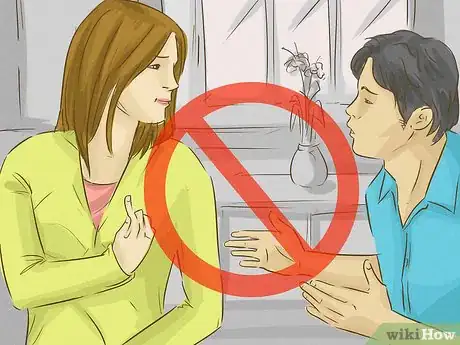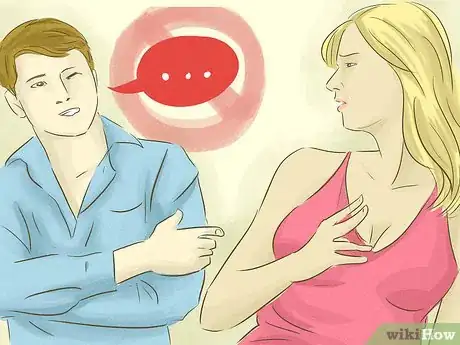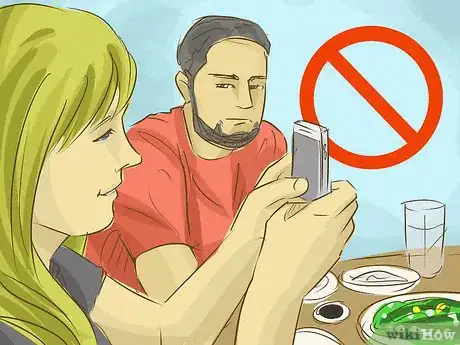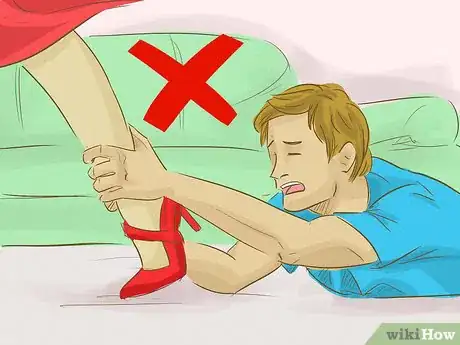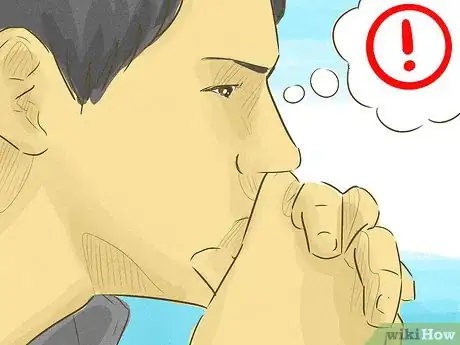This article was co-authored by Tara Vossenkemper, PhD, LPC. Dr. Tara Vossenkemper is a Licensed Professional Counselor and the Founder and Managing Director of The Counseling Hub, LLC, a group counseling practice located in Columbia, Missouri. She is also the Founder of and a Business Consultant with Tara Vossenkemper Consulting, LLC, a consulting service for therapy practice owners. With over nine years of experience, she specializes in using the Gottman Method of relationship therapy with couples on the brink of divorce, who have conflict, or who feel disconnected from one another. Dr. Vossenkemper holds a BA in Psychology from The University of Missouri, Saint Louis, an MA in Counseling from Missouri Baptist University, and a PhD in Counselor Education and Supervision from The University of Missouri, Saint Louis. She has also completed Level 3 training in the Gottman Method Couples Therapy approach and has been formally trained in both the Prepare-Enrich Premarital Couples Counseling approach and the PREP Approach for couples counseling.
There are 13 references cited in this article, which can be found at the bottom of the page.
wikiHow marks an article as reader-approved once it receives enough positive feedback. In this case, several readers have written to tell us that this article was helpful to them, earning it our reader-approved status.
This article has been viewed 498,523 times.
A parasite latches on to a host and exploits it for valuable resources necessary for its survival. If you suspect that you're in a parasitic relationship, then you must be worried that the person you're dating, much like a parasite, is sucking you dry, robbing you of emotional strength, money, time, and everything else that is valuable to you. If you want to know if you are in a parasitic relationship, then you have to see if the following signs apply to you. And if you are, then you better get out ASAP.
Steps
Noticing What You Do Together
-
1Ask yourself if your partner has to do everything with you. It's definitely possible to have almost everything in common, but it's still healthy to do some things separately and have some solitude.[1]
- Your partner may say that they love you a lot and want to be with you all the time.[2] [3]
- If every single time you step out of the house, even if it's just to pick up a prescription from the pharmacy or to get coffee, you hear your partner say, "I'll come, too!" then he or she may be a parasite.
- If you suddenly notice that your partner is always doing the things you used to love doing alone, from morning yoga to taking a walk after dinner, then he or she may be a parasite.
- If your partner also cannot do anything by him or herself, whether it's to have a coffee date with a new acquaintance or to get an oil change, and is always asking you to come along, then you may be in a parasitic relationship.
-
2Consider whether you have any separate friends. Have you suddenly noticed that all of your friends have become your partner's friends? To some degree, this is normal, but if ever since you got serious, all of your partner's own friends have fallen off the radar in favor of yours, that's a red flag.[4]
- This may be your significant other's way of ensuring you stay together forever. After all, who wants to deal with the awkwardness of breaking up when you have the exact same friends?
- If your significant other never had any other friends to begin with, this should also be another cause for concern. This is a sign that the person isn't capable of forming close bonds with people he or she isn't dating.[5]
Advertisement -
3Be cautious about paying for everything. Sure, everyone gets strapped for cash from time to time, but if you find that you're the one always paying for dinner, movies, trips, gas, and the big things, like the person's education, child support, rent and other bills, then it's worth examining if this is an arrangement you're comfortable with, and how your partner would respond if you, for example, lost your income. If the person you're dating takes it as a given that you will take care of him or her, sit down and have a talk pronto.[6]
- Your partner may want control over your finances.[7] [8]
- The person might even say, "I'd love to go out to dinner, but you know I'm so broke this month." This is a way of tricking you into paying while making you think it's your idea.
- Even if you have tons of money to spare, this should still be a warning sign. If the person you're dating is so willing to take advantage of your money, he or she will also be just as willing to take advantage of your emotions.
-
4See if you're doing excessive favors for your partner. In a healthy relationship, partners take turns doing favors for each other whenever one person needs a little help. In a parasitic relationship, one partner is always doing favors for the other and getting nothing in return. If you find that you're giving your partner rides everywhere, cooking all the meals or picking them up, running errands for him, and basically taking care of all the little things he or she is too lazy to do, then you may be infected by a parasite.[9]
- Though it may hurt, write two lists: one, a list of all the favors you've done for your partner, and two, a list of all the favors he or she has done for you. They don't match up, do they?
-
5See if your partner is completely asocial. This is another major problem. If any time you and your partner are out in public together, he or she refuses to talk to other people, demands your attention constantly, and generally shows no regard for others, then you need to rethink your priorities. It's one thing if your partner is really shy, but another if he or she is rude to others or just flat-out acts like they don't exist.[10] This is a sign that the person doesn't see a life outside of you.
- If you find that when the two of you go out, you have to constantly spend all of your time by your partner's side or he or she gets hurt or jealous, then you have a problem.
-
6See if your partner is upset any time you do your own thing. In any healthy relationship, both partners should feel comfortable doing their own thing. This can mean hanging out with your own friends, getting some quality family time, or just reading, running, or pursuing your own hobbies on your own time. If your partner truly loves and cares about you, then he or she should be happy when you pursue your own interests and grow as a person on your own.[11]
- If your partner is hurt, angry, jealous, or distant whenever you leave the house without him or her, even if you're just grabbing coffee with your cousin Sally, then he or she resents your individuality.
- If your partner checks in on you and asks when you'll be home every five minutes when you're out, then he or she may be a parasite.
- It may not be possible to convince them even though you show your phone or tell them where you have been.[12] [13]
-
7See if other people have voiced concern about your relationship. When people voice concern about your relationship, it's natural to get defensive and to feel even more determined to prove everyone wrong by trying as hard as you can to make things work. But if you find that your friends, family members, and pretty much everyone in your orbit is worried that your significant other is taking advantage of you, then there may be some truth to what they're saying.
- When you tell these people they're wrong, you end up driving them away. Then your partner gets exactly what he or she wants -- even more of your time and attention.
Noticing What You Talk About Together
-
1Notice if your partner is always talking about his or her problems. If you can't even remember the last time you shared your deepest fears or doubts with your partner, then you're in hot water. If you feel like your significant other is always the one who is talking, upset, getting comfort, and seeking and getting your love and attention, then you have a problem. It's okay if your partner is having a bad month, but if you feel like there is always something wrong in his or her life, then you may be getting used for emotional support.
- In a healthy relationship, both partners get to talk about their problems and concerns equally.
- If you feel like your partner is doing at least 80% of the talking and you're not particularly shy, then you have a problem.
- If any time you mention yourself, your partner tries to make your problems seem smaller by saying that he or she has it so much worse, then you have a problem.
-
2Notice if you never get to share your feelings.[14] If you're afraid to share your feelings because you think your partner will get angry and misunderstand you, or if you don't share your thoughts and feelings because you know your partner won't really listen, then you have a problem. You should feel just as comfortable about sharing your thoughts, fears, and hopes as your partner does.
- Both people should be able to share in a relationship, and if every time you try to talk about yourself, your partner says he or she is busy or tired, interrupts you and tries to make it all about him or herself, or just gets a glazed look that makes it clear he or she isn't listening, then you are getting used.
-
3Notice if there's no such thing as a compromise in your relationship. You're in a parasitic relationship if you feel like, no matter what, your partner always ends up getting exactly what he or she wants. You may find yourself giving in just because it's easier than fighting, because your partner will be mad if he or she doesn't get what he or she is after, or simply because you've convinced yourself that he or she must want it more. In a healthy relationship, partners work together to find a decision that can make them both happy, and take turns "giving in" to each other.
- Sure, it's not a big deal to give in on some of the small stuff, like about where to have dinner or what to watch on TV. But this habit can make it easier for you to give in on the big things, like deciding where to move together.
-
4Notice if you never hear any words of appreciation. When is the last time you heard your partner say how much you mean to him or her? If you can't even remember, then you may be getting used and taken for granted. Your partner may think it's a given that you know how much he or she loves you and how special you really are, but if your partner really cares about you, then he or she would tell you, not just assume that you know.
- If you don't even get thanked for all of the favors you're doing, then you are definitely getting taken advantage of.
- If your partner never compliments you or tells you how nice you look on date night, then you may be being used.
-
5Notice if you constantly have to tell your partner how much you love him or her. That's right. Your partner almost never tells you how amazing you are, but you find yourself feeling like you have to say "I love you" twenty times a day so the person doesn't feel like you're neglecting him or not giving him enough love and affection.[15] If you feel like you have to tell your partner how much you love him, how great he is, and how much you value him fifty times a day just to help him be less needy, then you have a problem.
- In a healthy relationship, both partners should compliment each other and say "I love you" around the same amount -- and only when they actually mean it.
Noticing How Your Significant Other Makes You Feel
-
1See if you feel guilty any time you don't give in. This is an important one. Have you noticed that any time you say no or don't give your partner exactly what he or she wants, your partner gets deeply disappointed. You shouldn't give in to your partner just because they are sad that you didn't meet their request, just like you shouldn't give in to a child throwing a tantrum in public. You shouldn't feel bad about not giving in to your partner's ridiculous requests.[16]
- Guilt should not be the driving force in any healthy relationship. Do you find yourself constantly doing things for your partner where you sacrifice all your pleasures just to make them happy? If you do not fulfill their wishes, do they withdraw from you until you give in?
- Are you made to feel that your partner is nothing without you or can not survive without you. These are signs that you may be in a parasitic relationship.
-
2See if you feel drained of energy after hanging out with your partner. Do you often find yourself feeling drained out after spending time with your partner?
- A parasite doesn't just drain your wallet and free time. But they can rip you off your energy levels—spiritually, emotionally and physically.
- A parasitic partner can suck the life out of you. You are constantly giving him or her emotional, financial support, convincing him or her that everything is okay, and they can even drag you into their problems making you feel equally responsible for whatever miserable state they are in.
- In a healthy relationship, partners empower each other and make each other feel like anything is possible. In a parasitic relationship, one partner drains the other partner's energy, making him feel incapable of doing anything.
-
3See if you feel like you're losing your identity. If you're in a parasitic relationship, then your significant other may be trying to make you feel like you're losing your sense of self; your partner will want this sense of self to be replaced by your sense of yourself as a part of a couple, as a being in a relationship. If you're forgetting who you really are and feel like you're losing track of all of the things that make you special and happy, then you may be in a parasitic relationship that is making you feel a loss of identity.
- In a healthy relationship, two people gain a stronger sense of themselves as they bond together as a couple; in a parasitic relationship, one person tries to take on the qualities of the other person and doesn't give him any time to figure out who he really is.
-
4See if you're starting to feel used. If you suspect that you're getting used, then it's likely that you probably are. If you get the sense that your significant other is only with you because of your apartment, your car, your money, or your ability to comfort him or her at all hours of the night, then you should get out of the relationship as soon as you can. If you feel like you're giving a ton of support and getting no support at all, even in the most basic things, like getting a "good luck!" note before a big exam, then you may be getting used by your partner.[17]
- Ask yourself, would your partner still be with you if it wasn't for your nice apartment/new car/big bank account/good looks? If you even hesitate a second before answering, then you're getting used.
-
5See if you stop feeling like your goals or desires matter at all. This is another way that a parasite can drain you of your own identity. If you're sacrificing everything so that your significant other can follow his dreams, finish school, move closer to his or her family, or pursue his favorite hobby for hours a day, then you may be in a parasitic relationship. In a healthy relationship, both partners have individual goals and work to get them to align; in a parasitic relationship, one person's goals become the focus of the relationship.
- You may not even have noticed that you've stopped caring about becoming a nurse or a chef because you're too busy trying to help your partner find his or her way.
- If your partner never even asks about what you want for your future or how you see your career five years down the line, then it may be because he or she is only interested in him or herself.
Expert Q&A
-
QuestionHow do you deal with a clingy partner?
 Erika KaplanErika Kaplan is a Dating Coach and Matchmaker for Three Day Rule, an exclusive matchmaking company across nine cities in the United States. With over six years of experience, Erika specializes in helping singles find quality matches through date coaching and premium matchmaking services. Erika graduated from Penn State with a Bachelor’s degree in Public Relations. She worked for Rolling Stone, Us Weekly, and Men’s Journal before leaving publishing to pursue her passion for connecting people. Erika has been featured on Lifetime, the Philadelphia Inquirer, and CBS as well as in Thrillist, Elite Daily, Men’s Health, Fast Company, and Refinery29.
Erika KaplanErika Kaplan is a Dating Coach and Matchmaker for Three Day Rule, an exclusive matchmaking company across nine cities in the United States. With over six years of experience, Erika specializes in helping singles find quality matches through date coaching and premium matchmaking services. Erika graduated from Penn State with a Bachelor’s degree in Public Relations. She worked for Rolling Stone, Us Weekly, and Men’s Journal before leaving publishing to pursue her passion for connecting people. Erika has been featured on Lifetime, the Philadelphia Inquirer, and CBS as well as in Thrillist, Elite Daily, Men’s Health, Fast Company, and Refinery29.
Matchmaker This is really about reinforcing your boundaries. Before discussing the situation with your partner, you need to establish what your own boundaries are and set the stage to find a kind of happy medium that satisfies you both.
This is really about reinforcing your boundaries. Before discussing the situation with your partner, you need to establish what your own boundaries are and set the stage to find a kind of happy medium that satisfies you both. -
QuestionWhat makes someone clingy in a relationship?
 Erika KaplanErika Kaplan is a Dating Coach and Matchmaker for Three Day Rule, an exclusive matchmaking company across nine cities in the United States. With over six years of experience, Erika specializes in helping singles find quality matches through date coaching and premium matchmaking services. Erika graduated from Penn State with a Bachelor’s degree in Public Relations. She worked for Rolling Stone, Us Weekly, and Men’s Journal before leaving publishing to pursue her passion for connecting people. Erika has been featured on Lifetime, the Philadelphia Inquirer, and CBS as well as in Thrillist, Elite Daily, Men’s Health, Fast Company, and Refinery29.
Erika KaplanErika Kaplan is a Dating Coach and Matchmaker for Three Day Rule, an exclusive matchmaking company across nine cities in the United States. With over six years of experience, Erika specializes in helping singles find quality matches through date coaching and premium matchmaking services. Erika graduated from Penn State with a Bachelor’s degree in Public Relations. She worked for Rolling Stone, Us Weekly, and Men’s Journal before leaving publishing to pursue her passion for connecting people. Erika has been featured on Lifetime, the Philadelphia Inquirer, and CBS as well as in Thrillist, Elite Daily, Men’s Health, Fast Company, and Refinery29.
Matchmaker Clinginess usually has to do with attachment styles. Oftentimes, a clingy partner has an anxious attachment style, which has a lot to do with past experiences from childhood and from dating.
Clinginess usually has to do with attachment styles. Oftentimes, a clingy partner has an anxious attachment style, which has a lot to do with past experiences from childhood and from dating. -
QuestionIs it okay to ask for some space in a relationship?
 Erika KaplanErika Kaplan is a Dating Coach and Matchmaker for Three Day Rule, an exclusive matchmaking company across nine cities in the United States. With over six years of experience, Erika specializes in helping singles find quality matches through date coaching and premium matchmaking services. Erika graduated from Penn State with a Bachelor’s degree in Public Relations. She worked for Rolling Stone, Us Weekly, and Men’s Journal before leaving publishing to pursue her passion for connecting people. Erika has been featured on Lifetime, the Philadelphia Inquirer, and CBS as well as in Thrillist, Elite Daily, Men’s Health, Fast Company, and Refinery29.
Erika KaplanErika Kaplan is a Dating Coach and Matchmaker for Three Day Rule, an exclusive matchmaking company across nine cities in the United States. With over six years of experience, Erika specializes in helping singles find quality matches through date coaching and premium matchmaking services. Erika graduated from Penn State with a Bachelor’s degree in Public Relations. She worked for Rolling Stone, Us Weekly, and Men’s Journal before leaving publishing to pursue her passion for connecting people. Erika has been featured on Lifetime, the Philadelphia Inquirer, and CBS as well as in Thrillist, Elite Daily, Men’s Health, Fast Company, and Refinery29.
Matchmaker Yes, it is okay to express that you do need a little bit more space and independence! If you feel like your partner is clinging and parasitic, give them the feedback and reinforcement they need to feel secure in the relationship. Follow through with your promises and make your boundaries pretty clear.
Yes, it is okay to express that you do need a little bit more space and independence! If you feel like your partner is clinging and parasitic, give them the feedback and reinforcement they need to feel secure in the relationship. Follow through with your promises and make your boundaries pretty clear.
References
- ↑ https://www.psychologytoday.com/us/blog/so-happy-together/201702/time-together-and-time-apart
- ↑ https://psychcentral.com/lib/signs-controlling-partner-relationship#signs-of-a-controlling-partner
- ↑ Tara Vossenkemper, PhD, LPC. Licensed Professional Counselor. Expert Interview. 27 October 2021.
- ↑ https://www.psychologytoday.com/us/blog/in-flux/201407/10-relationship-red-flags
- ↑ https://www.huffpost.com/entry/relationship-advice_n_1892990
- ↑ https://www.thisisinsider.com/who-should-pay-for-what-when-dating-2017-6
- ↑ https://psychcentral.com/lib/signs-controlling-partner-relationship#signs-of-a-controlling-partner
- ↑ Tara Vossenkemper, PhD, LPC. Licensed Professional Counselor. Expert Interview. 27 October 2021.
- ↑ https://www.thisisinsider.com/parasitic-relationship-signs-2019-1
- ↑ https://www.succeedsocially.com/awkwardpartner
- ↑ https://www.psychologytoday.com/intl/blog/friendship-20/201506/20-signs-your-partner-is-controlling
- ↑ https://psychcentral.com/lib/signs-controlling-partner-relationship#signs-of-a-controlling-partner
- ↑ Tara Vossenkemper, PhD, LPC. Licensed Professional Counselor. Expert Interview. 27 October 2021.
- ↑ https://www.psychologytoday.com/us/blog/resolution-not-conflict/201305/how-express-feelings-and-how-not
- ↑ https://www.psychologytoday.com/us/blog/snow-white-doesnt-live-here-anymore/201002/can-you-live-someone-who-never-says-i-love-you-part
- ↑ https://www.psychologytoday.com/us/blog/friendship-20/201506/20-signs-your-partner-is-controlling?page=1
- ↑ https://www.cosmopolitan.com/uk/love-sex/relationships/a10368869/am-i-being-used/





